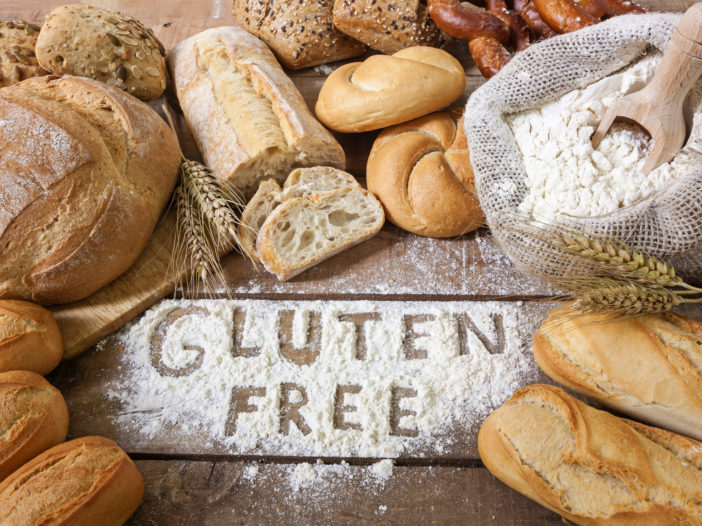
Going gluten free has become very popular in recent years. But is it just a clever marketing ploy to push the gluten-free food industry? Or is it a sensible thing to do for your health? And of course, there is no easy answer to this question. It depends on a few things.
So, let’s look at all things gluten to understand whether avoiding gluten is something that needs to be on your radar.
Firstly, what is gluten?
Gluten is a family of proteins which are found naturally in certain grains such as wheat, barley, and rye. And it is these proteins which give grain-based foods their chewiness and allow bread to rise and stay moist.
For some people avoiding gluten in the diet is a necessity. If you have any of the following conditions, follow a gluten free diet:
Coeliac Disease
This is an autoimmune disease and causes the small intestine to become inflamed. In Coeliac Disease, eating gluten causes the immune system to attack the lining of the gut. This can lead to damage of the intestines. It makes it difficult to absorb nutrients. And it can cause symptoms such as weight loss, diarrhoea as well as anaemia, osteoporosis, and dermatitis.
Wheat allergy
This is not an autoimmune condition and is more common in children than adults. This is a true allergy to the proteins in wheat and wheat products. Symptoms range from mild nausea right through to anaphylaxis which makes it difficult to breathe and can be life threatening.
And then there is this:
Non-coeliac gluten sensitivity
This is the most common form of a gluten related condition and is on the rise.
If coeliac and wheat allergy have been ruled out, then non-coeliac gluten sensitivity may be diagnosed in people who experience symptoms such as headaches, fatigue, and joint pain when they consume gluten.
And then this is where the waters become a little bit murky
There is some research which suggests that following a gluten free diet may help and even prevent certain autoimmune conditions such as Hashimotos, type 1 diabetes, Grave’s disease, and rheumatoid arthritis.
And it has also shown to benefit those people struggling with irritable bowel disease and inflammatory bowel disease as these conditions can be triggered by a gluten sensitivity.
What are the symptoms of gluten sensitivity?
They are pretty far reaching. But the most common ones include IBS, diarrhoea, constipation, bloating, gas, and pain as well as fatigue, headaches, joint pain, and skin issues.
These days, there is an increase in the number of people reporting an intolerance to gluten. And one of the reasons is due to the amount of processed foods in our diet. This is something that wasn’t around centuries ago. And the problem is this: Gluten is not just found in whole foods. It is used as a thickening agent in processed foods and can be found in crackers, breadcrumbs, pasta, cookies, pastries etc. It is also found in products such as soy sauce, salad dressings, gravies, flavoured crisps, beer, wine, and some processed meats. So, it’s pretty much everywhere in our diet!
Another reason may be because our gut health is not as robust as it once was. We know that gluten is a difficult protein to digest. And it is possible that we can no longer digest the amount of gluten in our modern diets
Should I go gluten free?
I guess the answer to this is yes – but only if you have been diagnosed with Coeliac Disease. Or if you are trying to solve any digestive issues or other symptoms you haven’t been able to get to the bottom of.
What should I do?
If you think that you may be sensitive to gluten and struggling with some of the symptoms mentioned, it may be worth trying an elimination diet. This involves cutting out gluten for 6-8 weeks to see if you feel any better. It is important to cut out gluten totally rather than just cutting back. And that’s because even a small amount of gluten can impact how you feel.
And after this period, try and re-introduce it. If your symptoms improve during the elimination period and then return, you know what you are dealing with. And it may be that gluten free is a dietary change you need to adopt.
I would certainly suggest that if you have been diagnosed with Hashimotos, trialling a gluten free diet is worth ago. And that is because research has shown a strong link between gluten and this condition.
If you do decide to give going gluten free a go, it’s worth reframing your approach. Instead of thinking it of a diet of restriction, think about how you can replace the gluten with even more nutritious foods. This is a great opportunity to ditch the processed foods, sugary breakfast cereals and baked goods. And just by doing this, you may start to feel better overall – certainly more energised and perhaps a little lighter!
Here are some great swaps to go gluten free!
Instead of wheat, rye and barley, try the following:
Quinoa
Brown Rice
Gluten free oats
Buckwheat
Lentils
Chickpeas
Cauliflower rice
Courgetti noodles
And why not have a go at making your own bread by buying gluten free flours such as quinoa and buckwheat?
My advice is to cook from scratch where possible, and in turn avoid all the gluten- free products in the supermarket. These are usually highly processed and won’t give you the wonderful array of nutrients which you need in your diet for good health.
If you would like further advice on your diet and lifestyle, why not get in touch today?
